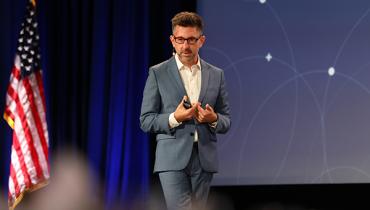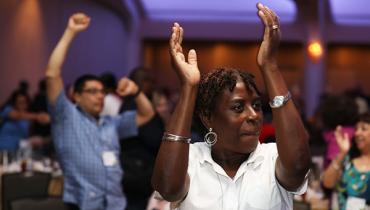What’s the single most important thing affecting student outcomes? Emotions. And not necessarily students’ own emotions but ours—those of the adults around them. So says Marc Brackett, a professor at Yale University and director of the Yale Center for Emotional Intelligence.
“I have to start by asking, ‘How are you feeling?’” Brackett said during the final plenary session at TEACH.
School is an emotional rollercoaster, Brackett noted, with studies that show high school students feeling tired, bored and stressed—emotions that hinder their creativity and academic performance. With a quarter of teens suffering from anxiety disorders, with bullying rates holding steady and the suicide rate up, he said, it’s no wonder their teachers feel frustrated, stressed and overwhelmed.
Workers in general feel overwhelmed, he said. And yet, popular culture exhorts us to be happy. To laughter, he asked: “How many of you see this as an indicator of great things happening in the future of America?”
Explaining that how teachers feel on a good or bad day can affect their grading by one or two full grades, Brackett said it’s a hard, cold fact that “how we feel each day, about ourselves and our students, is guiding the way we think and act.”
He also noted that, right now, kids have even more anxiety than the adults raising them. That said, it’s the adults who set the tone for a district, starting with the top leadership—the school superintendent.
Brackett took issue with people who say: “I remove my feelings before entering school” or “I put my feelings in a box.” Describing the small child who is told one morning that his parents are divorcing and then is shipped off to school, the professor asked, as a sympathetic moan rose from the audience: “You think he could put his feelings in a box?”
Brackett had simple but hard advice for members:
- Learn breathing techniques. “It’s not a religion. It’s just breathing!”
- Closely regulate your diet, nutrition and exercise.
- Build and maintain positive relationships.
- Be compassionate to yourself. Teachers are great at supporting students, but if they’re freaking out, they’re not as supportive as they could be.
- Guard against negative self-talk. It starts early in life.
Regulating your emotions takes practice, Brackett noted. No one is born with strategies—they have to be learned and practiced.
The educators and other school staff who are most frustrated are those who work in schools where their principals have low emotional intelligence, Brackett said. “Your workload is no different, but your stress load and burnout are significantly higher,” he said, adding: “If you’re going to do this work well, it’s about adult development, not child development.”
He suggested that educators ask themselves: How would you want to feel as a student in this school? For example, he pointed to the Seattle public schools, which adopted emotional intelligence as a key focus. Brackett asked students there: In a word, how would they like to describe themselves? The answer startled him: “selfless,” they said. When he asked why they picked that word, a student told him, “Sir, we as a class decided that the world is becoming too narcissistic.”
Words other students might choose include “spirited,” “united” or “respected.” Brackett suggested that teachers develop a “mood meter” of feelings. He also suggested taking a “meta-moment” in which you pause and consult your best self before you say or do something.
Among the tools Brackett has developed is a partnership with Facebook at InspirED.fb.com. His new book, Permission to Feel, is scheduled for release this September.
Above all, however, Brackett wants to leave teachers with several takeaways. First, emotions matter; they’re not “soft skills” but the hardest skills to learn in life. Second, work with adults before working with children. What do adults think about their own feelings? Next, understand that it’s never too early or late to improve your emotional intelligence. And know that systemic approaches work better than piecemeal. Ask yourself: What might change if every adult around you took this work seriously? It’s not a magic pill, but it’s a great place to start.
“For me,” he said, “what is most important is that we give kids the skills to achieve their dreams.”
[Annette Licitra/photos by Ron Aira]



